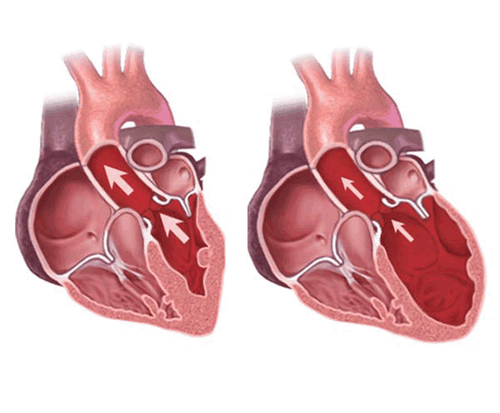This is an automatically translated article.
Rheumatic heart disease not only has the risk of causing many dangerous complications, but also often relapses. Therefore, the treatment course for rheumatic heart disease needs to be strictly followed by the patient, as well as strictly adhere to the prevention period.
1. Treatment of rheumatic heart disease
1.1 Treatment goals for rheumatic fever For the treatment of rheumatic fever in children and adults, doctors prioritize antibiotics, anti-inflammatory and heart failure treatment. The goals of the treatment are:
Reducing acute symptoms such as arthritis, heart inflammation,... in patients Killing streptococci in the patient's pharynx, throat and respiratory tract. Prevent patients from re-infection with streptococcal bacteria. Educate the patient and family members to better understand the disease in order to properly adhere to the rheumatic heart disease treatment regimen suggested by the doctor. In addition, it is also necessary to perform a throat culture or do a rapid throat swab test for streptococci for relatives who have contact with the patient, if the result is positive, they must also be treated.
1.2 Medicines used to treat rheumatic fever Some specific drugs commonly prescribed by doctors to treat rheumatic fever in children and adults include:
Antibiotics: Penicillins, macrolides and cephalosporins I or II. Anti-arthritis: Aspirin, Naproxen or Ibuprofen until clinical symptoms are gone and the dose is reduced when the inflammatory response returns to normal. Treat heart inflammation: Use specific drugs such as NSAIDs, corticosteroids and IVIG. Treatment of brain damage - mental: When the patient shows signs of dancing, chorea, it is necessary to rest in combination with carbamazepine. If dyskinesia is severe, corticosteroids or IVIG may be added. 1.3 Monitoring during treatment During the treatment of rheumatic heart disease, it is also necessary to continuously monitor the erythrocyte sedimentation rate (ESR) and C-reactive protein (CRP) so that CRP > ESR. The C-Reactive Protein (CRP) test should be done twice a week until the clinical symptoms are stable. Thereafter, continue to perform CRP testing every 1 or 2 weeks until the patient is back to normal.
2. Risk of rheumatic heart disease recurrence

In rheumatic heart disease, although there is a chance for a cure, the risk of the disease reappearing is completely possible. Medical experts have listed a number of factors that contribute to the recurrence of rheumatic fever, such as:
The patient does not follow the doctor's prescription to prevent recurrence. The patient's history had previously been entangled with many relapses. The interval from the last episode of rheumatic fever to the present is short. Patients often come into contact with people infected with strep, such as children, teachers, parents or members of the military. Getting sick at a young age makes the disease more likely to recur. Patients who have had rheumatic heart disease and have heart inflammation, whether it leaves sequelae or not, the risk of recurrence is quite high. There is a history of rheumatic heart valve disease.
3. Prevention of rheumatic heart disease
To prevent rheumatic heart disease, first start with the primary cause. This means that if a patient has strep throat, they must be treated promptly and aggressively, not letting the disease progress to cause rheumatic fever.
In case the patient has a history of rheumatic heart disease, secondary prevention is by taking antibiotics every month or every day depending on the doctor's prescription with the following time:
Time to follow up prevention for the disease patients without heart inflammation for at least 5 years after the last episode, until age 18. In contrast, if heart inflammation was present, the period lasted at least 10 years from the last episode until the age of 21. Regardless of whether the patient has had heart surgery or not, they must continue to be monitored until the above time is up. For post-streptococcal arthritis, the follow-up period is 2 years. When the time is up, it is also necessary to check the echocardiogram again, if it is found that there is an injury, then the secondary prevention should not be stopped, but it must be prolonged as if there is inflammation of the heart. If during the course of prevention with penicillin, the patient has a sore throat, then the patient and relatives who have been exposed to clindamycin must be treated.

4. Notes in the care of patients with rheumatic heart disease
According to the doctor's advice, taking care of the patient properly will help the treatment of rheumatic fever promote effective and quick recovery. Patients and relatives need to keep a few notes in mind as follows:
Should rest at the bed, the patient's room should be quiet, cool, fully supported with amenities, and have family members on duty to take care of the patient. squirrel in daily life. The Foller position, half lying half sitting, is medically recognized as a standard for patients, especially good support in the treatment of rheumatic heart disease in children, helping to avoid breathing difficulties and muscle tension. Patients should eat light, easy-to-digest foods such as milk, fish with a relative lightness, choose fruits with a lot of potassium and do not drink too much water. Avoid strenuous exercise such as taking the stairs, doing manual work... to reduce oxygen demand and symptoms of fatigue and shortness of breath. Limit joint movement to a minimum to relieve pain, without the need to massage or apply heat or cold at the joints. Supplement with B vitamins such as B1, B6, B12 and sedatives, as well as monitor the patient's temperature regularly. In addition to taking medication for rheumatic fever and preventive monitoring, both patients and normal people must clean their teeth, mouth, nose and throat regularly to prevent infections caused by streptococcal bacteria. Should not be subjective to the body getting cold, pay attention to eating enough nutrients to help constantly improve health, support to strengthen the body's resistance.
Please dial HOTLINE for more information or register for an appointment HERE. Download MyVinmec app to make appointments faster and to manage your bookings easily.













